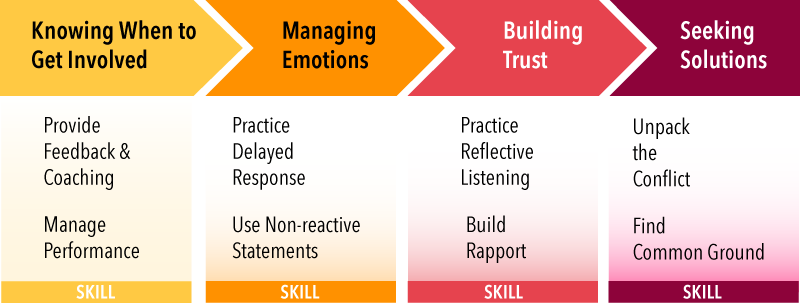Mastering conflict management skills will allow you to deal with conflict in a way that improves relationships, solves problems and supports everyone’s success in their work.
The following steps will help you manage conflict more effectively:

Know When to Get Involved
When a member of your team or department is involved in a conflict at work, your role as a supervisor is to provide feedback and coaching to help them develop and use effective conflict management skills. In many cases, you may not be directly involved, but your support will be important in helping the person manage the situation effectively.
Learn: When to get involved? What is your role? What are the steps you need to take?
Manage Emotions
When facing a conflict, it is normal to feel angry, frustrated, and stressed out. Managing these negative feelings allows you to focus on the situation in a productive way and to avoid doing and saying things that make the conflict worse. Reacting out of anger and frustration is not likely to resolve anything.
Learn: Steps, tips and techniques for staying calm and productive during conflict.
Build Trust
Even if you are starting with little trust or even some hostility, the foundation for effectively managing a conflict is to build whatever trust you can with the others involved. This may not be easy, especially when you are dealing with difficult behavior from another person, but it is your best path to success.
Learn: Key tips and techniques to building trust in a conflict situation, Do's and Dont's.
Seek Solutions
Conflict can feel like a competition in which you either win or you lose. However, most of the time, there are solutions that will give everyone something they need. Learn about a set of specific skills that will help you unpack the conflict, find common ground, and identify these win-win solutions.
Learn: Steps and questions to ask, priorities and possibilities to consider.